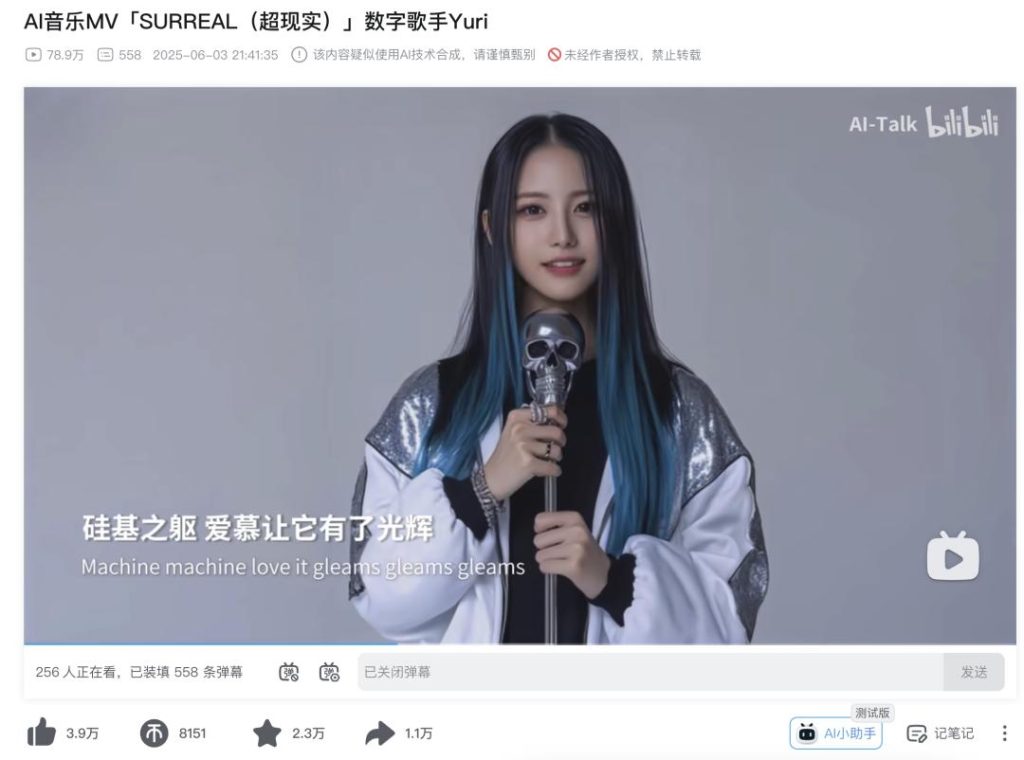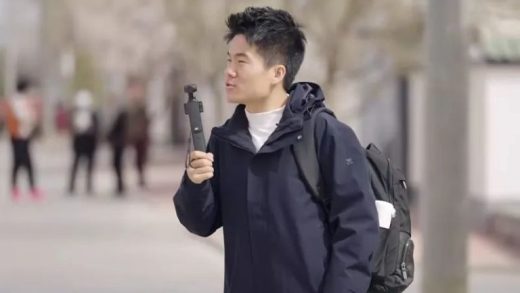
Read More《AI歌手Yuri火爆全网,周杰伦们慌不慌?》
Positive Reviews: The Explosive Popularity of AI Singer Yuri Represents an Industry Breakthrough through the Resonance of Technological Innovation and User Needs
The phenomenal rise of AI singer Yuri is not accidental but an inevitable result driven by technological progress, user needs, and content innovation. Its success not only validates the technological maturity of AI in the field of music creation but also showcases new possibilities in the virtual idol market, injecting new vitality into the music industry and even the pan – entertainment industry.
Firstly, Yuri’s explosive popularity is a direct manifestation of the technological breakthroughs in large AI models. As mentioned in the news, the music MV “SURREAL” of Yuri has reached a level of realism that is “hard to distinguish from the real thing.” Behind this is the collaborative progress of large music – generation models (such as Tencent’s SongGeneration and Kunlun Wanwei’s Mureka V6) and large video – generation models (such as Sora and Veo). In the past, AI – generated music was often criticized for its “mechanical feeling” or “style fragmentation,” and video generation was difficult to be accepted by the public due to “unnatural lip – syncing” and “stiff movements.” However, Yuri’s MV not only solves these technical pain points but also breaks through the early barriers of the “uncanny valley effect” through detail optimization (such as the smoothness of body movements and the naturalness of expressions), shifting users from “curiosity” to “immersion.” This improvement in technological maturity directly lowers the threshold of music creation. In the past, the “music + MV” combination that required a professional team to spend weeks to complete can now be generated by AI in a short time, providing a technological foundation for the improvement of industry efficiency.
Secondly, Yuri has grasped the core user demand for “idols without scandals.” In the entertainment industry, the “scandals” (negative news) of stars have become the norm, and the trust cost of users in real – life idols continues to rise. As an AI singer that “never has scandals,” Yuri exactly fills this demand gap. Compared with traditional virtual idols (such as Hatsune Miku and Luo Tianyi), Yuri’s advantage lies in that its creation process relies more on AI than on manual work, and theoretically, it can achieve “24 – hour online” and “unlimited content output.” Compared with “imitative AI singers” such as AI Stefanie Sun and AI Wang Leehom, Yuri is a completely original virtual image, avoiding copyright disputes and fan – emotion conflicts with real – life stars. This positioning of “purely virtual + risk – free” makes Yuri more easily accepted by the public as an independent “star” rather than a “substitute.”
In addition, Yuri’s multi – platform distribution strategy has accelerated its breakthrough into the mainstream. “SURREAL” was simultaneously launched on platforms such as Bilibili, NetEase Cloud Music, and Video Accounts, covering both “content consumption” (video platforms) and “music consumption” (audio platforms) scenarios. As a community where young users gather, Bilibili’s attributes of “bullet – screen interaction” and “secondary creation” have magnified the discussion of Yuri (such as the data of 789,000 views and 39,000 likes). NetEase Cloud Music has retained core listeners through “music collection” and “playlist recommendation.” This combination of “content attraction + music retention” has expanded Yuri’s influence from niche circles to the mass market, forming a sharp contrast with the previous AI singer Qi Yue, who failed to break through due to the “KuGou VIP restriction.”
From an industry perspective, Yuri’s success marks that AI singers have entered the “commercial exploration stage” from the “experimental stage.” In the past, AI music was more regarded as a “technological showcase” (for example, “Auxuman Vol.1” in 2019 was not accepted due to its niche style and rough production). However, Yuri has proven the market value of AI singers through “high – quality content + accurate user needs.” As IDC data shows that the market size of Chinese AI digital humans increased by 85.3% year – on – year in 2024, Yuri’s case will attract more capital and creators to enter the market, promoting the improvement of the AI music industry chain (such as model development, IP operation, and peripheral derivatives).
Negative Reviews: Behind the Prosperity of AI Singers, There Are Hidden Challenges in Technology, Commercialization, and User Needs
Although Yuri’s explosive popularity is exciting, the hidden concerns behind it are also worthy of vigilance. For AI singers to truly become a “phenomenal market,” they still need to overcome multiple obstacles such as technological limitations, unclear commercialization models, and the impact of user – generated content.
Firstly, the technological bottleneck has not been completely broken through, and the balance between realism and personalization remains a difficult problem. As mentioned in the news, there was a “weird – looking face” in Yuri’s celebration video, and some users were triggered by the “uncanny valley effect,” which exposed the instability of current AI – generation technology in detail processing. The “anthropomorphic feeling” of virtual images requires a high degree of detail control (such as micro – expressions and muscle movements), and existing large models may still have problems such as “model penetration” and “stiff expressions” when dealing with complex dynamic scenarios. In addition, although AI – generated music can meet “standardized needs” (such as pop and electronic styles), it is still weaker than human creators in “personalized expression” (such as emotional depth and cultural metaphors). For example, although AI Stefanie Sun’s covers became popular because of their “similarity,” the lack of originality led to the inability to sustain the popularity. Although “SURREAL” by Yuri is of high quality, it has not shown a distinct “personal style,” and users may lose interest due to the “sameness.”
Secondly, the commercialization model has not been established, and the path to realize the value of IP is unclear. Currently, the income of AI singers mainly depends on the revenue sharing of music platforms and advertising cooperation. However, compared with traditional virtual idols (such as Luo Tianyi’s figurines, concerts, and IP games), the derivative monetization ability of AI singers is still weak. As mentioned in the news, although Qi Yue had the support of Tencent’s resources, it failed to form IP influence due to “few works” and “low search exposure.” Although Yuri has a high playback volume, specific commercialization actions (such as peripheral products and brand endorsements) have not been announced. More importantly, users’ willingness to pay for “AI singers” is in doubt. Since users can use large AI models to generate songs by themselves (for example, inputting “a lively pop song” can get a finished product), why should they pay for AI songs created by others? This trend of “user self – sufficiency” may weaken the market demand for AI singers. If an “irreplaceable IP value” (such as the “second – dimension cultural symbol” attribute of Hatsune Miku) cannot be built, AI singers may become “tool – type products” rather than “star – type IPs.”
Finally, copyright and ethical disputes may become long – term hidden dangers. Although Yuri is an original AI singer, avoiding direct conflicts with real – life stars, if a large number of AI singers imitate real – life voices in the future (such as AI Jay Chou and AI G.E.M.), it may lead to copyright disputes. For example, the explosive popularity of AI Stefanie Sun once caused legal disputes due to “lack of authorization,” and it was not until Tencent cooperated with Wang Leehom’s studio to launch “AI Wang Leehom” that the problem was partially solved. In addition, there is also a vague area in the “ownership of creation” of AI singers. Since the lyrics, music, and singing of songs are all generated by AI, should the copyright belong to the model developer, the training data provider, or the operation team? Without clear legal definitions, it may hinder capital investment and the standardization of the industry.
Suggestions for Entrepreneurs: Focus on Content, IP, and Technology to Build the Core Competitiveness of AI Singers
The explosive growth of the AI singer market has emerged, but entrepreneurs need to avoid blind following and should build core competitiveness from the following three aspects:
-
Take “High – Quality Content” as the Foundation and Balance Quantity and Quality
Content is the core barrier for AI singers. Yuri’s success proves that users have a strong demand for “high – quality music + highly realistic MV.” Entrepreneurs need to invest resources to polish content details (such as optimizing the micro – expressions generated by AI and adjusting the emotional expression of music) to avoid losing users’ trust due to a “rough feeling.” At the same time, referring to Luo Tianyi’s content reserve of “hundreds of albums,” AI singers need to maintain high – frequency output (such as releasing 1 – 2 new songs per month) to consolidate users’ awareness through continuous content exposure. For example, Qi Yue had insufficient influence due to “too few works.” Entrepreneurs can establish a content production pipeline of “AI generation + manual review” to improve efficiency while ensuring quality. -
Strengthen IP Operation and Create a “Virtual Idol with a Story”
The essence of virtual idols is “emotional connection.” AI singers need to be upgraded from “technological products” to “IPs with a soul.” Entrepreneurs can learn from the “second – dimension cultural symbol” positioning of Hatsune Miku or the “representative of Chinese fashion” persona of Luo Tianyi, design a unique background story for AI singers (such as setting Yuri as a “music explorer from the future”), a unique style (such as electronic Chinese style or cyber – pop), and enhance user participation through cross – platform interaction (such as Bilibili live broadcasts and Weibo topics). In addition, IP derivative development (such as figurines, virtual concerts, and game linkages) is the key to commercialization. Entrepreneurs can make early arrangements and cooperate with trendy toy brands and game manufacturers to expand revenue sources. -
Pay Attention to Technological Iteration and Solve the Pain Points of “Realism” and “Personalization”
Technology is the underlying support for AI singers. Entrepreneurs need to continuously invest in model optimization. On the one hand, to address the “uncanny valley effect,” more sophisticated dynamic capture technologies (such as real – time facial expression generation) and physical engines (such as simulating muscle movements) can be introduced to improve the naturalness of virtual images. On the other hand, the music – generation model can be optimized through “user – feedback training.” For example, collect users’ comments on Yuri’s songs (“more lyrical,” “faster rhythm”) and convert them into model training data to make the style of AI singers closer to users’ preferences. In addition, cooperating with large – model manufacturers (such as Tencent and Kunlun Wanwei) to obtain customized technical support can reduce R & D costs and accelerate technological implementation. -
Make Early Arrangements for Copyright and Compliance to Avoid Legal Risks
As the AI singer market expands, copyright and ethical issues will become crucial. Entrepreneurs need to clarify the copyright ownership of “AI – generated content” (such as signing an agreement with the model provider to clarify the ownership of original content) to avoid affecting the IP value due to legal disputes. If it involves imitating real – life voices, cooperation with the right – holders should be reached in advance (such as the model of “AI Wang Leehom”) to ensure compliance. In addition, a “content review mechanism” should be established to avoid AI generating inappropriate content (such as sensitive lyrics and controversial images) and maintain the “scandal – free” persona of AI singers.
Conclusion: The explosive popularity of AI singer Yuri is the result of the combined effects of technology, demand, and content innovation. However, its long – term development still needs to overcome challenges in technology, commercialization, and user needs. For entrepreneurs, the opportunities in the AI singer market lie in “early entry” and “differentiated competition.” By creating high – quality content, strong IP operation, and technological iteration, they can create irreplaceable virtual idols and gain a foothold in the future industry reshuffle.
More
Startup Commentary”Did those cities that went viral really make money from tourism?”
Startup Commentary”Sports Venues Yet to Open Raise 140 Million in Funding with Social Concept”
Startup Commentary”Sports Brands Flock to Sponsor College Competitions”
Startup Commentary”How has the ubiquitous Bluetooth technology become a “familiar stranger”?”
Startup Commentary”AI Pets: Making VCs and Users Go Crazy?”
Startup Commentary”County-level consumption doesn’t rely on the “Brahmins””
Latest
- Startup Commentary”Three post-2005 entrepreneurs are reported to have secured a new financing of 350 million yuan.”
- Startup Commentary”Retired and Reemployed: I Became Everyone’s “Shared Grandma””
- Startup Commentary”YuJian XiaoMian Breaks Issue Price on Listing: Where Lies the Difficulty for Chinese Noodle Restaurants to Break Through in the Market? “
- Startup Commentary”Adjusting Permissions of Doubao Mobile Assistant: AI Phones Are a Flood, but Not a Beast”
- Startup Commentary”Moutai’s Self – rescue and Long – term Concerns”





